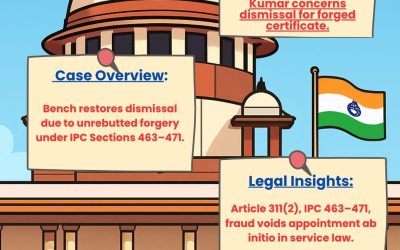Headline
The Supreme Court of India alerts of contempt to ensure compliance with laws of manual scavenging.
Summary
The Supreme Court of India shows strong dissatisfaction regarding the inaction on elimination of manual scavenging by the government and making sure that there should be compliance with laws like the Employment of Manual Scavengers and Construction of Dry Latrines (Prohibition) Act, 1993, and the Prohibition of Employment as Manual Scavengers and Their Rehabilitation Act, 2013. The bench agreed to ensure compliance, by stressing on the significance of human dignity.
Key Facts
- Case Name: Dr. Balram Singh vs. Union of India & Ors., W.P. (C) No. 324/2020.
- Judges Name: Justice Sudhanshu Dhulia and Justice Aravind Kumar.
- The Supreme Court observed non-compliance with its directions given on 20th October, 2023.
- National survey of manual scavengers not initiated; statutory bodies still remain unstructured in various states.
- In 2013,40 sewer deaths were reported; no FIRs were registered.
Legal Insights
The Supreme Court of India noted that sewer deaths should be registered under Indian Penal Code (IPC) Section 306 (abetment of suicide). It restated directions for better technology, increased compensation for victims, and stricter accountability mechanisms.
Impact
The judgment of the Supreme Court of India reaffirms its commitment to human dignity and safety. It holds authorities responsible for the continuous failure to implement statutory protection .
Why It Matters
The case showcases continuous systemic neglect of marginalized communities, calling for immediate action to uphold basic human rights and eradicate hazardous practices.
Source:








